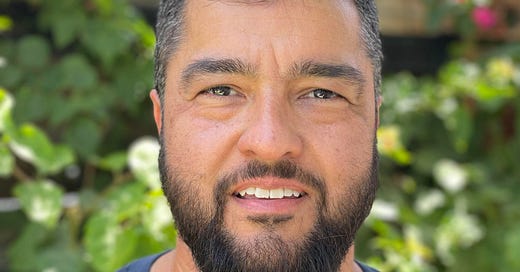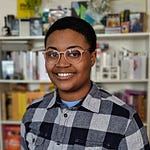Tristan Rajaratnam began his career as a teacher, and his ability to foster growth through genuine connection shines through in this interview. Join us as he shares conversations that make a difference and the healing and grounding practices that make it all possible.
TNG Worklife is a podcast and ongoing conversation about the work-life experiences of the transgender, nonbinary, and gender expansive communities.
You can find us on Apple, Spotify, Google and Instagram.
This podcast is always free, and if you enjoyed it, you can support the work by subscribing for as little as $8 a month.
About Tristan Rajaratnam
Website: http://www.tristanrajaratnam.com/
LinkedIn: https://www.linkedin.com/in/trajarat/
Credits
Opening music - Abstract Fashion Pop by QubeSounds
Closing music - Where the Light Is by lemonmusicstudio
Episode Transcript
Kai Stowers
[upbeat pop music plays]
Hi, I'm Kai Stowers, host of TNG Worklife, a podcast about the worklife experiences of people in the trans, nonbinary and gender expansive communities. This week I meet with tech worker Tristan Rajaratnam. We talk about conversations that change outcomes even when you can't change hearts and minds.
We talk about conversations that do change hearts and minds. And we talk about how in these challenging, challenging times, we each stay grounded enough to touch into joy, connection, and belonging. Let's get into it.
Hi Tristan, and welcome. I'm so glad to have you on the TNG Worklife podcast today.
Tristan Rajaratnam
Hi Kai. Nice to be here.
Kai Stowers
Can you say a few words about who you are to our audience?
Tristan Rajaratnam
Yeah. I'm Tristan Rajaratnam. I use he/him pronouns. Also, I love they. They's always welcome. I've been in tech for quite a while now, so I'm very happy to be here to talk about my experiences as a trans person in tech.
So you didn't actually start off in tech. Can you tell me how you began your career?
Tristan Rajaratnam
Sure. My undergraduate degree is in special ed and my master's is in behavioral analysis, mostly in education. So I worked with kids with special needs with behavioral issues, people with brain injuries for quite a while.
Kai Stowers
Can you tell me some of the skills that carried over from that career into your current one? You laugh.
Tristan Rajaratnam
Well, I laugh cuz my interview, the hiring manager was laughing when I talked about the behavioral issues and the interventions and the things that we did. She said, oh, we need that here.
Because it's true, it's about humans and you really got to see, how, it's about how you relate to people who come from all walks of life.
Kids teach you so much when you're working with them, especially kids with brain injuries who have different parts of their brain that's been affected. And you can see how personality or speech is affected. And so you really learn a lot about yourself.
Kai Stowers
Yeah. What is one of the lessons that the kids taught you that you carry forward to this day?
Tristan Rajaratnam
I remember as a queer person back then, I had female pronouns but I was always masculine presenting and short hair and such. And so these kids would love to get at your weakness and try to get to you.
Kai Stowers
Mm-hmm.
Tristan Rajaratnam
They thought that was the way in.
Oh, aren't you a boy? Aren't you a boy? And I'll be like, well, I look like one, so what do you think?
Kai Stowers
Yeah.
Tristan Rajaratnam
It was like an easy reflection for me with them because they're children. But then that was good practice for when adults could be kind of mean.
But even when they look at you like sideways, wait, who are you? What are you? That look, even if they're not being mean, I could then practice playing around with that. It was still difficult throughout, but it helped me to play with it a little bit more.
Kai Stowers
Right. You're like, Hey, this is not the first time somebody's thrown this at me. I'm ready for you.
Tristan Rajaratnam
Yeah, exactly, exactly.
Kai Stowers
How did you make that really big career transition?
Tristan Rajaratnam
I was fortunate to have a friend whose girlfriend worked in a financial technology company, and offered me an entry level position. I was a little burnt out. I had put all of myself into it, and I needed to have a little bit better boundaries because I was just trying so hard to help these children and I needed to actually focus on healing myself.
So the company also had great health insurance that covered therapy in a very robust way. So I was able to really dive into healing myself work.
Kai Stowers
Yeah, I see this so often in the nonprofit and human services world. It's got such a strong mission and it's so hard for people to have those healthy boundaries cause they wanna give so much.
Tristan Rajaratnam
It's hard to find that balance for sure.
Kai Stowers
Well, tell me more about what you're doing now.
Sure. I work as a contractor for Meta and I am working on video analytics. We are installing hardware to put analytics on top of the video feeds of security cameras on site. Instead of having to comb through hours of video footage, that can take 20 hours to go through to find the one person who stole a laptop, for example, you could have an analytics that could help you shorten that duration to a couple hours.
Something I'd never thought I would ever do in my life, but it's very interesting to learn something new.
Kai Stowers
What do you see in your future?
Tristan Rajaratnam
Well, I can see myself getting back into teaching of meditation, yoga, some other healing space. I think I'm excited for welcoming teaching of some sort back into my life.
Kai Stowers
And you were recently in Costa Rica. Was this at all tied to yoga, meditation, and or healing?
Tristan Rajaratnam
Absolutely. Typically when I travel these days, it's around some sort of yoga retreat or meditation retreat. It's helped me tremendously.
I have a wonderful teacher who's dear to me and she's helped me with my yoga practice and meditation. We're always in process and life so that's a lifelong thing. But especially when I was transitioning, as my body was really changing, yoga really helped with movement and alignment. There's no perfect yoga pose. It's a matter of what your body can do. So allowing it to move in ways that was uncomfortable or painful at times was super helpful to work through it with yoga and meditation.
And I have many injuries for sports and things like that. So the list is unending of the benefits.
Kai Stowers
Yeah. And for people who maybe don't have experience with some of the pain and the things that come up in yoga or meditation, can you say more about why somebody would even want that?
[laughter]
Tristan Rajaratnam
Because the other side is clarity that you've never had before. The pain from trauma in my childhood of many levels, from abuse to neglect in terms of me being trans, not being able to thrive as a child. So you have all these blocks energetically and then injuries and actual physical pain and emotional pain.
So all of that has been there my whole life. So depression I've needed therapy. So when it comes up the choice... I say choice, but I say that loosely. The options are, do I face this and look at it, it's painful, or do I not? Every choice is valid whether you're ready to or not.
But no matter what, it's gonna come back again until it's looked at in a loving way to help transform it, transmute it. And yoga, meditation has been one aspect that's helped me.
I obviously had a therapist for many years, decades, and also have yoga and then also have a healer I work with now. So there's always a supportive element in my life to face those hard, painful moments because the other side is clarity. The other side is beauty. And I don't say that like it's simple.
It's beauty because of the paradox of the pain and the suffering and the beauty of life. So it just changes a perspective on the pain and suffering.
Kai Stowers
Yeah. Yeah, I really love it. Resmaa Menakem has a framing. He calls it clean pain or dirty pain. Clean pain is when you feel it, you process it, you move through it. And then dirty pain is when you take it out on yourself or others.
Yeah. You don't get a choice about the pain, but you get a choice about, or an option on, how to work with it.
Tristan Rajaratnam
Yeah, absolutely. It is difficult to see that path towards the not harming self or others. But once you're on it, it's hard to step off of it and you don't want to.
Kai Stowers
Yeah. Yeah, no, I really relate to that. Cause I think I was in my thirties before I got into therapy and I tried a lot of other things when all of those things didn't work out, I was like maybe I can try some therapy and look at this in a different way.
And now that I've done that, I absolutely would never go back. But in the middle of it, when all that pain was coming up, I was like, is this just gonna be loss and grief and mourning forever? And fortunately, there was another side of it for me.
Tristan Rajaratnam
It's so true. The healer I work with now, she always says If you find yourself in hell keep going.
Kai Stowers
I love that.
Tristan Rajaratnam
So, like you said, when you're in the middle of it and you feel like this is the worst, I'm gonna go back to my old habits. No, actually keep going cuz it's not gonna last forever.
Kai Stowers
Yeah. You can call it self-care, you can call it transformational work, but I feel like it's so important right now for us in the trans and non-binary, gender expansive community to have some sort of grounding, some sort of safer place so we can actually be who we are and feel everything that's coming up, whether it's sadness or rage or grief or anything else.
Can you maybe talk a little bit about how you're holding all the attacks on the LGBTQ community and not getting any more impacted by it than say we have to be, and I'm taking notes. [laughter]
Tristan Rajaratnam
Well, it's an interesting topic, I think everybody talks about taking social media breaks, and I think it's important. And I say that because the energy of hatred is strong, and the more you tap into it, the more you get fueled into the opposite side of it, which is your fear, your anger, your triggers.
It's just hatred or an attempt to keep that present in all of us. So if we can step out of that and go, oh, wait, yes, I'm triggered. Lemme go find grounding.
I gotta, I'm gonna go sit by a tree. And you sit by that tree and you go, oh, actually I'm safe. I'm fine. This is beautiful right here. The paradox, right? This is absolutely beautiful. And this is the same earth that this hatred's happening over there, right?
So if you can keep getting back to that, I say tree, just as the example, whatever that is for you. And then stay in that energy, even if you do see it on social media because you're just scrolling and all of a sudden, bam. Oh, another law passed, another person is murdered. And then it's, if you're not outraged, you're not working hard enough towards, well actually if I'm not outraged, I'm actually in a calm, peaceful place and can do better work on myself and for others from a calm, peaceful place of action, of movement, of changing.
For me, it's important to not get drawn into the battle of the energy of us versus them and they hate this and they're not good. That doesn't do me any good cuz that just takes my energy and I just go to a darker place. If I stay light, then when I talk to somebody on the street and have a conversation and they say something that's a little off in my mind, I can say something quickly that changes it and it lights it up into a new way.
Or I come out to them and say, cuz now I have to come out. I never used to have to come out when I was always perceived as androgynous. And now as someone who passes and people think I'm a cis male, I now come out.
But I do it in a way then that, it changes a mind. It's not a fight on social media, it's, Hey, yeah, you, you've known me for a while.
Kai Stowers
Right.
Tristan Rajaratnam
There's the example that really changes a mind. And again, we don't all have to do that, and you pick your places in safety but I find being grounded and present really helps me to navigate all of that.
Kai Stowers
Yeah. no, that makes a lot of sense. And. I think the attacks are designed to put us, completely understandable, to put us into that reactive mind so that we are reacting rather than responding. For my mindfulness practice at least, I have done a lot of work on responding rather than reacting
Tristan Rajaratnam
Right. Exactly.
We've all had to do that.
Kai Stowers
Because it's so easy to go a hundred miles an hour into the, I am in danger. And sometimes that's the appropriate response. If you are in danger doing whatever you need to do is absolutely what needs to happen. And a lot of times, we are not in immediate danger.
We do have that moment to take a breath and figure out what's the right response. And sometimes the right response is, I'm not gonna engage with this. Sometimes the right response is just walking away. And like you were saying, there's sometimes where there's enough safety. I can have this conversation.
Tristan Rajaratnam
Yeah.
It's so true and it's a valid response to be triggered and into a place. I've been there. And honor that, and the more we can find ourselves in it and say, yep, I'm triggered, or, oh, I see what's happening.
Oh, I said that, oh God, did I really say that? That's okay. Or I did that. Oh God. Can I delete that?
Kai Stowers
Those words really did just leave my mouth.
[laughter]
Tristan Rajaratnam
Yeah. Right. We're all human and find good outlets for the voice.
Go to a protest where you can scream at the top of your lungs in a peaceful way, right? Whatever it is, and then give yourself a break, and then just come at it the next time a little differently and say, oh, how can I reframe this? Or how can I be more honoring to myself you know, before I get thrown into that outrage?
Kai Stowers
Yeah. Beautiful. I’d like to go into a role you had a few jobs ago. So you were a lead of the Pride ERG at Uber. So can you tell us a little bit more about what an ERG is broadly and what the Pride ERG at Uber was?
Tristan Rajaratnam
Yes, absolutely. I was the global lead for the Trans ERG at Uber. The Trans Employee Resource Group.
A lot of corporations have these resource groups that help support subsets of populations within the companies. So, Uber had a Pride ERG and the Trans ERG was created within that, just to really make sure that the trans and nonbinary folks were getting the support they needed. So I was a global lead and Uber was in so many countries and it was wonderful to be at an international global company and see some of the impacts around the world of having a pride and a trans ERG.
There were many opportunities to help folks who were transitioning or who were non-binary and wanted to change pronouns or names. One of them was just setting up support sessions, one-on-one with the employee. If they wanted to, I would hop on a call, meet up with them in person, go grab coffee.
Or if the managers, came to us and said, oh, one of my employees is transitioning, I would love to, pick your brain. We'd be like, yeah, great. You wanna be a good ally, let's do it. Those conversations were wonderful to see the desire and the eagerness to help support the community.
Another one was, I kicked off an initiative to look at all the enterprise apps internally. If you log into Slack and Google Suite and Zoom and your name, your dead name pops up, it's one of the worst experiences. Um, talk about triggers. So how do you reduce the frequency of that happening, if not eliminate it?
It's really looking at all the applications from a technology perspective and ensuring that legal name does not always pop up. You have an option of display name to make sure that your real name shows up in that field. Not all applications have it, and some have it that you can't change it once it's been in there for the first time.
I know a lot of people would have their name pop up to their coworkers, their dead name, their legal name, and you just cringe when you see it or hear someone talk about it.
So we were trying to get some technology answers or at least an audit, going.
Kai Stowers
Both are great. I left one company, they had well-established ERGs, but as far as I knew, there weren't any trans people who were out in the workplace, and you know, there's just casual transphobia in the air all around us, and so I'd heard plenty of that. I'm like, ah, I don't know if this is gonna be the place for me.
Even though I'd been there for 15 years. I wound up leaving for that, and some other reasons.
Tristan Rajaratnam
Hmm.
Sure. Yeah.
Kai Stowers
And then the next place I was in didn't have any ERGs at all. And one of the things I ran into was even the legal name change, I kept on finding my old name in random applications. Practical, relatively easy to implement that make can make a big difference.
Tristan Rajaratnam
Oh, a hundred percent. And if you get the right engineers involved, some of them get excited, oh, I could solve this problem. You know, like, they wanna help these allies, so sometimes it's just about engaging the right folks to do it as a side project, you know?
Kai Stowers
One of the strengths of a well designed ERG is allowing for that interface between ERG members and leadership, and I'm wondering if that's something that Uber had in place, and if so, what are some of the conversations that you were able to have?
Tristan Rajaratnam
Great question. This is something I was very excited about working at Uber. This was around 2018, 2019, and the executive leadership under Dara [Khosrowshahi] and Bo Young Lee was the head of D&I at the time, and they really wanted to bring in the Pride and Trans ERGs to help with some of the business deals that the Uber Eats platform was wanting to engage with.
Many corporations wanted to get onto the platform and do partnerships, and you can imagine some of them might not have the best record with the LGBTQ community. And so how do you move a needle? How do you change things? Their strategy of course, is money. It's a corporation, how do you make money?
Of course. But Bo really wanted to have these uncomfortable conversations, you know, bringing us in to say, Hey, we don't agree with this partnership for these reasons. And then the sales leadership would be like, Okay, great. Let's see if we can get them to change. And how awesome is that? If you have a company that's willing to say, Hey, we will only partner with you if you do these things.
And they asked us for what those things should be. Don't donate to groups that are funding hatred legislation, for one example, and if they're willing to do that, then change can happen. One of these companies, their perception was horrible.
But what I learned is they have great programs for their LGBTQ employees, but they're not gonna publicize that because they don't wanna lose the base that wouldn't be interested in that.
So it is just an interesting thing to learn and see, but these conversations can change the needle, and they did a lot of things to try to improve and meet our needs.
Kai Stowers
Some of my learnings in my organizational psychology master's program is it's a lot easier to change behavior than changing hearts and minds. And I think this is a really beautiful example of, we're not asking you to change what you believe as a company.
If you wanna keep the customer base you have, okay? And let's have a conversation about what can be done.
Tristan Rajaratnam
Absolutely. I dunno if you've heard I just saw this morning that the Los Angeles Dodgers had said that the Sisters of Perpetual Indulgence were no longer invited to their Pride night. And This was disheartening for me on many, many levels. First of all, the Sisters have always done phenomenal work.
I get goosebumps. I get chills when I think about their service to all communities. And it's just wonderful work that they do. And for them to be excluded, you just don't know them. You obviously don't know them. So today I just saw that the LA Dodgers have issued an apology to the Sisters, and they're now invited again. I don't have all the information, but what that tells me is some deep conversations happened.
It's that conversation that says, let's come to the table. With compassion, with let's have a conversation cuz you guys got this wrong and we'll tell you why. And we just wanna help you understand this.
I don't know what went on behind the scenes, but the feeling I got when I read that was they had a conversation
Kai Stowers
That was my take too.
Tristan Rajaratnam
It's beautiful when that can happen. I'm not mad at the Dodgers. They course corrected.
Great. You want that.
That's all you can ask for.
Kai Stowers
Yeah. And I also think our landscape has changed so much. Corporations used to be able to say, I'm gonna avoid controversy. I'm gonna not take a stand. And I think more and more leaders are finding ou,t some the hard way, that whatever action you take, there is gonna be pushback.
And I think not often enough does leadership prepare for what's gonna happen next. Can you think about ahead of time, Why are you having a Pride night? Who are you supporting? What is your messaging when you get pushback? How are you going to address that? If they had had that in place ahead of time, I think it would've been a smoother road.
This is something that's not just happening for the Dodgers.
Tristan Rajaratnam
A hundred percent.
Kai Stowers
I see this in so many different corporations who are like, I wanna do the right thing. I wanna support the LGBTQ community. And then they're really taken aback by the pushback they get.
Some handle it well, and some really make a bigger mess of it. And that's something that I think could be avoided with a little bit more planning.
Tristan Rajaratnam
And I think the conversation that ensues can bring it all together and collectively you move forward. Does that make sense? Like it's not one person, like you said, making a decision and then everybody's like, oh, now I gotta clean up the mess that the CEO did cuz he said this, or she's did that, or they did that.
Kai Stowers
And I feel like this goes back to the mindfulness practice. We can wish that we're never gonna get triggered. Or if we're triggered, then we act perfectly, whatever that means. But a lot of life is going, wow, I just made a mess of that. What can be learned here and how can I move forward?
Tristan Rajaratnam
Absolutely. Well, and that's the thing, for allies, especially allies who are new to diving into this, I have great compassion for folks who are trying. It's about what one step forward and it's how do you educate yourself and as you make mistakes, forgive yourself and move forward and do the right thing next time.
I think that's all we can ask.
Kai Stowers
Yeah, and I can think of all of the things I've had to unlearn about the LGBTQ community broadly from how I was raised in a small town in Texas. And that's been a lot of my work, dismantling all of the internalized homophobia, biphobia, transphobia. And if I can't make room for others in the world to have their own learning process, what kind of world are we gonna have?
Tristan Rajaratnam
Absolutely.
Kai Stowers
And there's times that I need to step away and say, this is not the conversation that I need to have, but I can respect that it's a conversation they need to have and let them have that room and time.
Tristan Rajaratnam
Yeah, that's great.
Kai Stowers
Because we talked about, the power of having a difficult conversation where growth happens. What's on the other side of that?
Tristan Rajaratnam
How do we unite really from even in the queer community? How do we come back to like, we're all just people? Even the person who hates trans people in a small town of America is just a human living their life.
But maybe this person, is completely fearful for their children's safety and legit isn't trying to be a jerk.
Right. I can have compassion for that.
I would also love to have a conversation with that person. You know what I mean? But the hatred, people who are making these laws, that's a different story, right? They're, manipulating, they're trying to do things in a horrible, cruel way, you know?
So, how do we get rid of that division and find the common ground?
Kai Stowers
Yeah, yeah. And that is the work out of polarization.
If we could imagine a place where politicians stood up and said, I fundamentally disagree with everything my colleague across the aisle says and is driving for, but I respect the fact that they love this country as much as I do,
we would be in another world, and that work is so hard to do because polarization is a place of fear. It's when we feel our identity is attacked. It's the person you mentioned in a small town who doesn't know anything about drag queens except what they've heard online.
Right? My way of life, if my child is gonna be attacked, I'm gonna move into polarization. And I do inclusion work and this is being able to reach people and have those conversations and support them in growth. If I can't see them as human beings, if I can't understand that, hey,
you got to where you are for perfectly valid reasons and you wanna grow, then I can't do the work. All of the things you've talked about, the yoga, the meditation, going and sitting by a tree, I mean, my version of sitting by a tree is going and playing hockey. Um, everyone's mileage differs a little bit,
but if I can't come back to myself and find some sense of grounding, some sense of spaciousness around the really, truly frightening things are happening in the world, then I can't be effective. And sometimes this is an hour by hour or minute by minute conversation I'm having with myself.
[laughter]
Tristan Rajaratnam
Yeah. Well said. Looking at what it's triggering within you in those moments when someone is attacking you or the woman from the small town, you run into her someday, and she says horrible things. Whoa. What just happened? Then find yourself, go to play hockey, and whatever it is to find yourself back so you can have a response that, feels good at the end of the day, and good doesn't mean nice.
I'm not saying you have to just be like, oh, it's okay. No, it's a firm boundary, but you can't put a firm boundary in place when you are spinning out cuz then you're just engaging. And again, it's not bad, none of it's bad. Like you said, sometimes you just have a reaction.
That's it. And sometimes it's needed. But sometimes a good strong boundary can really go a long way.
Kai Stowers
Agreed. Agreed. Yeah. I'm laughing cuz I was having a really hard time last week and a friend of mine had said, you need a 24 hour hold on media. And I kind of pushed back and she's like, actually let's make that 48 hours.
[laughter]
Tristan Rajaratnam
Give me your phone now. Gimme your phone now.
[laughter]
Kai Stowers
Exactly, exactly. And I did put the phone down and I spent time with actual human beings in person. I'm not gonna say that my anxiety has completely disappeared, but I'm in a better place and I'll take it.
Tristan Rajaratnam
Yeah, I mean, anytime I see some headline that is stating another law was passed or some sort of hatred being spewed at the trans and non-binary community or LGBTQ community in general, or women's rights, or let's go through the list. It's triggering. I keep talking about being Zen, but I'm human.
It triggers me and I absolutely feel enraged. I feel sad, I feel devastated, it's how we should feel to some extent, but not to what deep, dark place does it take you to.
Hold up. No, that's not helping anything.
So then it's like, let's climb out of there. That doesn't mean now I ignore it. If we have strategies that take us completely away from it it's gonna come back.
So what's that relationship to navigate it in a new way?
Kai Stowers
Yeah. And times like this when you're looking at what's happening and it's like, how could I not be completely triggered or taken down by this? I think of Victor Frankl who, um, he worked in extraordinary circumstances. He was a Jew who could have fled Germany and he chose to stay and go into the concentration camps in order to help his fellow Jewish people.
One of the things he talked about on who was able to come through it were the people who remembered they had some measure of choice. And he said the last thing that is ever taken from us is our ability to choose our response. And when things feel really tough, this is something I come back to. I still have some measure of freedom even in this environment.
So that's the darker side and the lighter side to that is trans joy is resistance. When we are able to step into our joy, into our lives, into our communities, that is proving that our humanity can never be taken from us, no matter what laws, no matter what violence is taken out on us.
Tristan Rajaratnam
Yeah, well said. I mean we all grew up in a world where we didn't see trans people and anything we saw in movies was horrible. We watched that documentary Disclosure.
I have to say super painful to watch, but I hope all allies watch it to see the depiction and how the self hatred was fueled by these depictions. So are we actually worse? I don't know. I can't say that we're worse.
I don't think so. Visibility is here. We didn't have that before, so I still look at this as progress and people are gonna think I'm crazy. But is it still hard and horrible and cruel? A hundred percent.
These things can all exist at the same time. Progress and cruelty. We've seen that. Forever. I mean, look at racism right now. Is it worse than it was? I don't know. How do we compare, how do you really compare different experiences? So I think progress is happening. Joy is there for the taking, whether it's in hockey or sitting by a tree or the myriad of other examples.
So the more we focus there and light each other up and then light the way for others, that's what wins.
And when you say, I think this is progress, even though all of these horrible things are coming up, it reminds me what you talked about earlier. If you find yourself in, hell, keep going. Right.
Kai Stowers
One of the framings I like around my meditation practice is, say, you sit down and you try to concentrate, you get everything but concentration.
Your mind goes everywhere. If you sit down and try to meditate on loving kindness, you get everything that's not loving kindness. It's a purification process and all of these really tough things will come up. And if we, either as an individual in our meditation practice or a community or a country can hold all of that and say, Hey, this is all coming up and we need to work through it.
Like that conversation with the Dodgers, for instance, then we can keep going. No moment is our ending spot.
Tristan Rajaratnam
I love that. Yeah. No moment's the end.
Kai Stowers
Yeah.
Tristan Rajaratnam
Possibility is always there.
Kai Stowers
And sometimes it's the greatest pain that leads, I mean, sometimes, isn't it? Every time that the greatest pain leads to the most transformation.
[laughter]
Tristan Rajaratnam
Yeah, and we're laughing cuz it's so absurd that that's true. But it's true.
Kai Stowers
Yeah.
All right. Do you have any last words for our audience? What is something that you would want anyone listening to this podcast to take with them into the world?
Tristan Rajaratnam
My hope is that this conversation shows there's possibility even the hardest places. Even in the horrible news coming out, there's still hope and possibility for change and a shift in perspective or reframing, in your own personal day to keep yourself out of that dark place can go miles for you and for those around you.
So hold that and keep that light as the focus.
Kai Stowers
Yeah. I love that. Some of the work I do with other trans and non-binary and gender expansive folks, the despair is so real and the work there is support. Like, how do we get you through this? Like how can you find just a little bit of light to get you through that?
[optimistic music plays]
Tristan Rajaratnam
Yeah.
Kai Stowers
All right. Well thank you so much, Tristan. It's been wonderful to be in conversation with you.
Tristan Rajaratnam
Thank you Kai it's fantastic to be here.
Kai Stowers
Thank you so much for listening to season one, episode three of TNG Worklife, an independent podcast produced by Kai Stowers, LLC. This podcast is always free, and if you enjoyed it, you can support this work by subscribing at tngworklife.substack.com for as little as $8 a month. Your generous support goes towards production costs.
Paying subscribers receive additional content as well as discounts on workshops and trainings that I lead. If you would like to learn more about my coaching and consulting work, you can contact me through my website, kaistowers.com.
Finally, I wish that each of you find grounding, connection, and abundance in your lives.
















Share this post